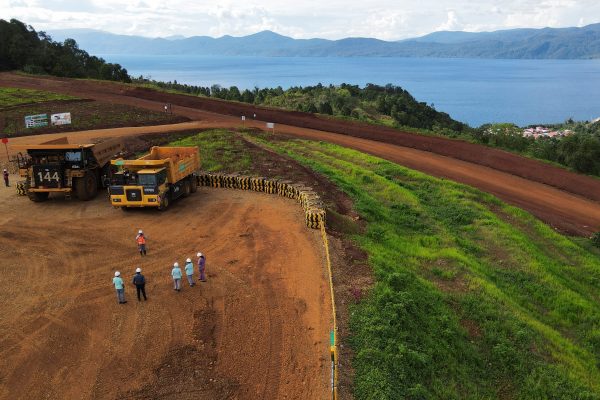Instead, ‘Jokowinomics’ might be most powerfully symbolised by the string of metal smelters and battery factories springing up as a consequence of his program of ‘downstreaming’ — or hilirisasi, as it’s known in Indonesian — the legal framework for which was set under the presidency of Susilo Bambang Yudhoyono but has largely been implemented by Jokowi.
After a number of false starts over the years, the government has issued a series of regulations banning or taxing the export of key minerals as mandated by a 2009 mining law that marked a significant shift towards a ‘resource nationalism’. Aided by a boom in demand for inputs for batteries used in electric vehicles — especially nickel, of which Indonesia is the world’s biggest producer — a huge shift in investment from raw ore mining to minerals processing has taken place.
Data from Indonesia’s Investment Coordinating Body, BKPM, analysed by the Jakarta think tank IDEAS shows that investment in minerals processing was US$7.8 billion in total between 2010 and 2014, rising to US$15.8 billion between 2015 and 2019. Between 2020, when a ban on nickel exports came into full effect, and 2022 there has been more than US$23 billion investment in minerals processing, most of it from China and Hong Kong.
Even the IMF, while encouraging a phase-out of export bans and a warning of the distortionary effects that export bans impose on global markets, estimates that about two-thirds of the increased value of Indonesian nickel output can be attributed to government interventions rather than increased prices.
On the surface of it, then, forced ‘downstreaming’ via export bans has worked just as it was meant to. But in the absence of any serious cost–benefit analysis of the program, it’s hard to say whether there was a more efficient path to encouraging investment in value-adding industries, that also allowed Indonesia to benefit from the large-scale export of unprocessed minerals.
Clearly, the ‘downstreaming’ program is unfolding on a very thin evidence base.
What is self-evident, meanwhile, is that the export bans on unprocessed ore are contributing to a shift away from markets and rules as the key guiding forces in the trade in so-called ‘critical minerals’, and, as a flow-on effect of that, the development of global electric vehicle production chains. As James Guild has noted on these pages, the policy highlights ‘Indonesia’s willingness to intervene in markets and buck the principles of free trade when it is in its national interest’.
The European Union knows this all too well. It challenged Indonesia’s nickel export ban via the WTO’s dispute settlement mechanism: Brussels was successful in arguing that the ban was against the rules, and Indonesia — not a member of the MPIA — has ‘appealed into the void’ to the non-functioning Appellate Body, effectively blocking the EU’s complaint.
As Liam Gammon writes in this week’s lead article, the political trends in Indonesia point, if anything, to a doubling down on Jokowi-era economic policy.
The strongest candidates for the presidential elections scheduled for February 2024, Defence Minister Prabowo Subianto and Central Java Governor Ganjar Pranowo, are both aligned politically with the government. Despite sharing a party affiliation with Ganjar, in Gammon’s assessment, Jokowi is tending to favour Prabowo to succeed him. While Anies Baswedan, with a different approach to economic strategy, still harbours presidential hopes, his chances of coming through from behind look slim.
‘Technocrats and investors will have a hard time convincing the next government that there are more efficient ways for Indonesia to get greater economic value from its huge mineral resource endowments and attract investment in manufacturing’, writes Gammon.
Yet, if they fail in doing that, Indonesia is likely to deny itself exports of less processed raw materials to much larger markets that cannot now be serviced from an Indonesian base. Other suppliers, the Philippines and Australia among them, are corroding Indonesia’s share in global supplies, as Indonesia lurches away from the internationally-oriented development strategy that has served it so well over the past few decades.
The EAF Editorial Board is located in the Crawford School of Public Policy, College of Asia and the Pacific, The Australian National University.

